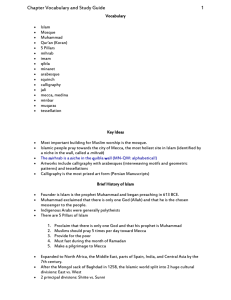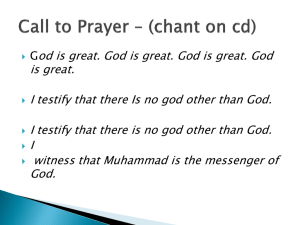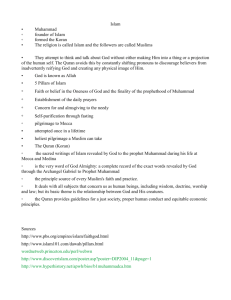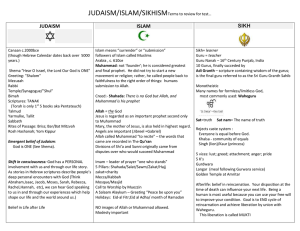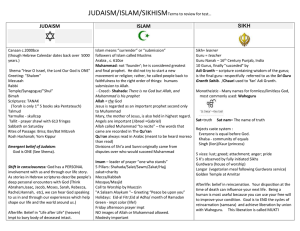The Foundations of Islam
advertisement
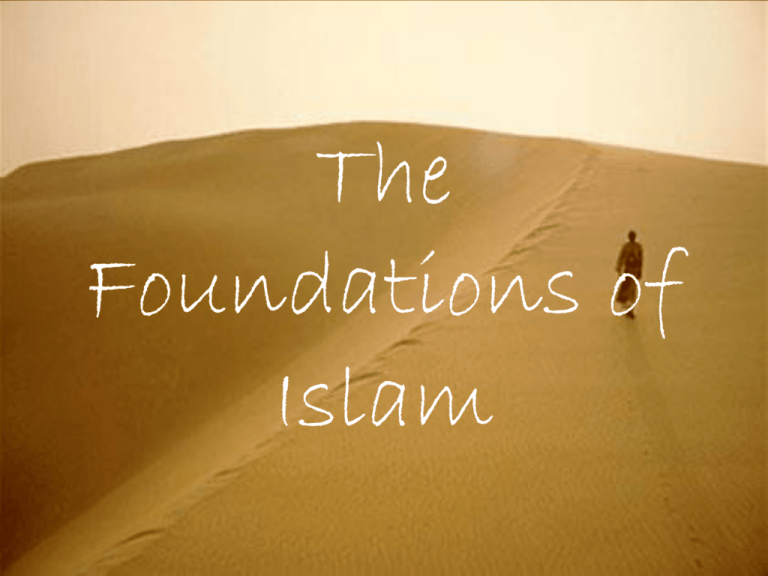
The Foundations of Islam Muhammad • Born 570CE – hard early life • By 30 he was prosperous merchant • Was familiar with many religions in Arab society • Had basic understanding of Christianity and Judaism The Visions • 610CE – visions that made him believe there was one true God – Allah • Delivered by Gabriel • Muhammad must explain the message to others • Started with family and friends and expanded Medina – one of Islam’s holy cities His Mission • Followers wrote down his teachings – called the Quran (Koran) • Communicates his understanding of Allah and his relation to the world • the authority for Islamic doctrine & social organization • There is also the hadith – sayings attributed to Muhammad and stories of his deeds. The Hijra • His beliefs brought him into conflict with the elite • He attacked greed, idolatry, polytheism • He and followers were persecuted • He fled to Medina in 622Ce • This journey is known as the hijra • Start of the Islamic calendar In Medina • He became head of society - needed his guidance • Organized them into a umma (community of the faithful) • Gave them legal and social code • Raided caravans • Gave alms to widows, orphan, poor • Began to refer to himself as the “seal of the prophets” – the final prophet • Allah would reveal his message through him • He believed in Abraham, Moses, and Jesus • Held Hebrew scriptures and New Testament in high esteem • Believed God, Yahweh and Allah were the same Return to Mecca • 630 – returned, attacked, conquered city • Forced elites to Islam – built mosques • Ka’ba – preserved the black rock shrine as symbol of greatness • 632 – led first pilgrimage there • Died 632 with most of Arabia under control Five Pillars of Islam • • • • • 1. 2. 3. 4. 5. Allah is only god – Muhammad as his prophet pray daily facing Mecca observe fast during Ramadan alms to weak and poor make at least one pilgrimage to Mecca The Sharia • Islamic holy law • Guidance on proper behavior • Inspired by the Quran & early accounts of Muhammad’s life • Guidance on marriage, family, slavery, business, politics, crime, etc • Islam is more than religious doctrine • It is a complete way of life with social & ethical values Brunei Mali Caliphs • Means “deputy” – would be leader of Islam • First was Abu Bakr • Hard to choose caliphs b/c of ambitions, personal differences, clan loyalties • All this led to rise of factions and parties • Traditional Muslims called Sunnis • New sect was Shia • Called Shiites • They originated b/c they wanted Ali’s descendants as caliph • Wanted him as first – became fourth (until assassinated) • Shia were the minority • Differences: observed holy days in honor of leaders and martyrs • Taught Ali’s descendants were infallible, sinless and divinely apptd to rule Shia Taking Over • In next 150 yrs. Islamic armies took: • Syria, Palestine, most of Mesopotamia, Egypt, most of N. Africa, Sasanid & Persia, Hindu kingdom of Sind, most of west N. Africa and most of Iberia • Threatened Gaul Umayyad Dynasty • • • • • • • 661-750CE Prominent merchant clans Reputation and alliances brought stability Est. capital at Damascus Highly centralized rule Played favorites Ruled as conquerors • Other religious groups allowed to practice – But had to pay jizya – head tax • Could not rise to positions of authority • Caliphs began to live luxuriously • Were lax about doctrine and morality • Faced a lot of resistance Abbasid Dynasty • 750-1258 • Abu al-Abbas led rebellion in Persia • Rejected Umayyad authority – defeated them in battle • Founded the dynasty which would last until Mongol invasion • Allowed other ethnicities in gov’t • Defeated Chinese army at Talas River – Important b/c it ended Tang Dynasty expansion into central Asia – Also opened door to Islam among Turkish people • Empire expanded due to autonomous forces in empire taking over other • New capital at Baghdad • Had a gov’r to represent the caliph and implement his policies • Ulama “people with religious knowledge” and qadis “judges” set moral standards and resolved disputes – Very influential & spread values • Est. bureaucracy for taxes, finance, coinage and postal system • Lots of wealth in taxes • High pt. under Harun-al-Rashid 786-809 – Baghdad – center of banking, business, industry – He supported writers, artists – Tossed money into the streets – Sent elephant and presents to Charlemagne – Empire declines slightly after he died – Civil war b/w his sons • Disputes over succession became common • Gov’rs took advantage – acted on their own • Took taxes and created bases of power • Popular uprising and peasant rebellions • Saljuq Turks gradually moved in and took over • Caliphs just figureheads before Mongols took over



